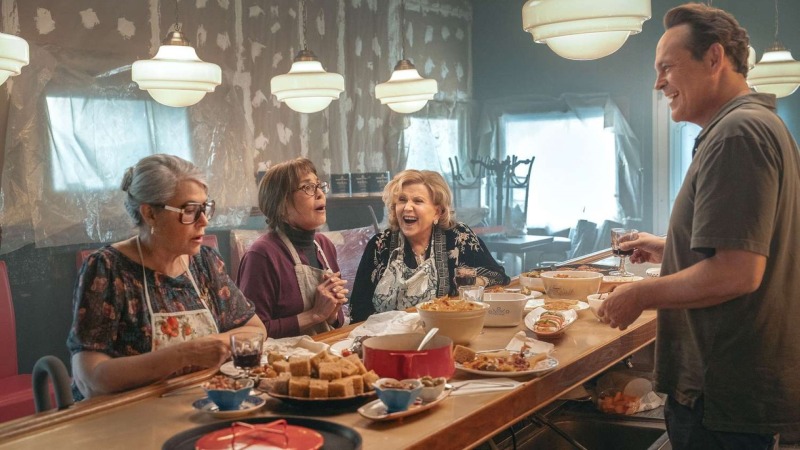Nonnas Has Just Enough Sauce (and Cheese) for its Dramedy

When a film is as determined to set its emotional and nostalgic hooks in you as Netflix’s Nonnas, there’s really no reason to beat around the bush–you might as well begin your film with an all-out aesthetic assault on the senses (and the visual taste buds). Echoing so many other, food-centric Italian films that have come before, Nonnas opens on long montages of food preparation and consumption, traveling from a neighborhood bakery where the red, white and green of chocolate-sheathed rainbow cookies gives way to the softer dusting of powdered sugar on fresh zeppole pastries and cannoli shells. It’s “40 years ago,” and we’re trailing behind a young, mop-headed Joe Scaravella on grocery errands for his radiant mother and effusively loving Nonna, returning to the old woman as she hand-cuts strands of tagliatelle and prepares her Sunday gravy sauce for what appears to be an apartment full of 100 people. Everywhere, the hands of family and friends grasp and grab at the food–lasagna, beef, tomato slices and burrata, jugs of wine–but what they’re really grasping at is Nonna’s love, which is freely given to any and all who seek it. We’re ensconced in an utterly warm, idyllic time … the implication being that there are no hardships here, not in the warm embrace of family and the past. A character literalizes it in a saying, in case it goes over the audience’s heads: “A tavola non si invecchia.” Translation: “One does not grow old at the table.”
Cut to “40 years later,” and Joe has indeed somehow grown old, or as old as a 55-year-old Vince Vaughn is allowed to be portrayed in a movie. Presumably, he didn’t spend enough time at the table to keep up with peers like his childhood friend Bruno, played by a significantly younger, comically fit Joe Manganiello. Maybe it’s just that Bruno got married, and thus had access to a more populated table and its associated age-retarding effects? Joe, on the other hand, ended up caring for a declining mother in her old age, and we join him in Nonnas at Mom’s funeral as he shares tiny glasses of what is presumably grappa with Bruno and other old neighborhood friends, all of whom gift him with food and remark on the wonderful cooking skills of his mother and Nonna. Thus, the stakes are set for a warm and mildly weepy dramedy: How will Joe heal after this mother’s passing, and how can he keep the spark alive that her food–and her mother’s food before her–brought to so many people?
The answer, if you’ve seen the marketing for Nonnas, should be clear enough: He’s going to open a little enoteca in her honor, and staff it with real nonnas from the neighborhood, giving all of them a chance to share their food (and thus their love) with the community. Some light hardships will be faced; some relationships will be mended. Perhaps he’ll discover the long-lost secret of his own grandmother’s Sunday gravy? Ah wait, it’s a Netflix movie: Of course he will.
Nonnas does not aspire to much; nor should we expect it to. The Stephen Chbosky dramedy gets by on charm and unabashed nostalgia for simpler times, though it occasionally does afford its titular old biddies a welcome chance to humanize themselves in the modern day. It’s based, more or less, on a true story of the real Joe Scaravella, who really did open a restaurant in his mother’s honor, Enoteca Maria, in 2007 on Staten Island, where they do indeed feature a rotating cast of global nonnas cooking in a variety of cuisines to this day. Are any of them former nuns, like Talia Shire’s character here? It’s hard to say.
Regardless, Big Night or The Bear, this is not, though it may bear some kind of superficial resemblance to those stories of hardship in opening and operating a restaurant. Where those other pieces of food-adjacent media are really plumbing the psyches of those who choose to devote their energy to restaurant service, and the crushing economic realities that come along with a dream, Nonnas instead mops up the surface-level melodrama like so much extra sauce, the pitfalls never a real threat. As Joe scours the neighborhood for promising nonnas to staff his restaurant, not one person broaches a topic like “Hey, should an arthritic old woman be lifting 50 pound roasting dishes full of veal shanks?” One of them, his mother’s longtime friend Roberta (Goodfellas’ Lorraine Bracco), lives in a retirement community and insists that she wouldn’t be able to do the job because “I need compression socks just to get to the bathroom.” Can you believe that these physical ailments are never mentioned again the moment that the biddies start whirling around the kitchen? Soon she’s preparing whole roasted lamb’s heads (capuzzelle, still on the Enoteca Maria menu), and the years and all their concerns have simply melted away. Ditto for Teresa (Talia Shire, mousy), Gia (Susan Sarandon, ebullient) and Antonellia (Brenda Vaccaro, bossy and combative), who assemble Joe’s Avengers-esque dream team of nonnas who represent the various corners of Italy–they’re mostly in the neighborhood of 80 years old, but why shouldn’t they be able to work full restaurant dinner shifts on their own, with zero assistance?
-

-

-

-

-

-

-

-

-

-

-

-

-

-

-

-

-

-

-

-

-

-

-

-

-

-

-

-

-

-

-

-

-

-

-

-

-

-

-

-








































